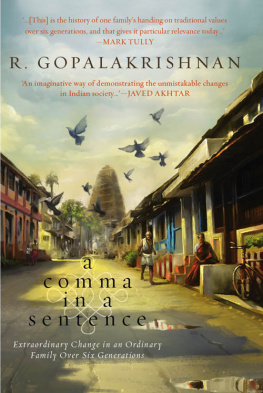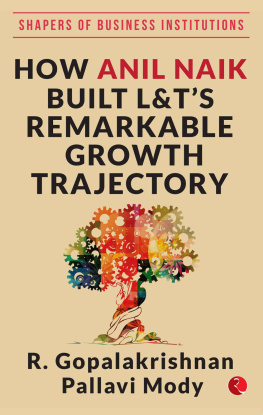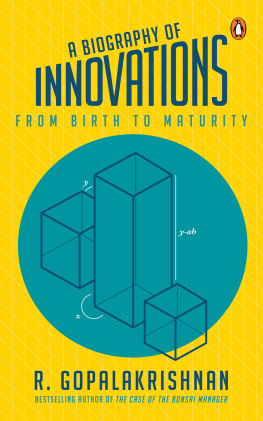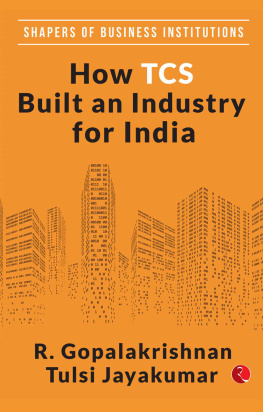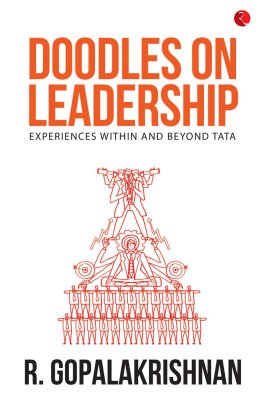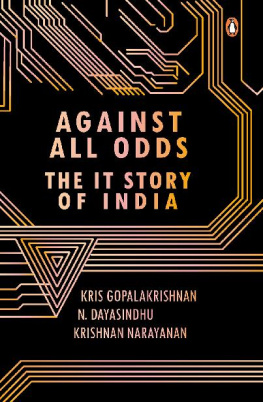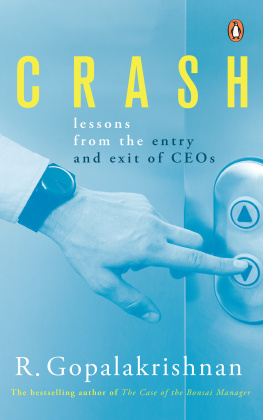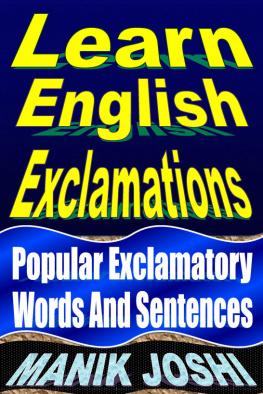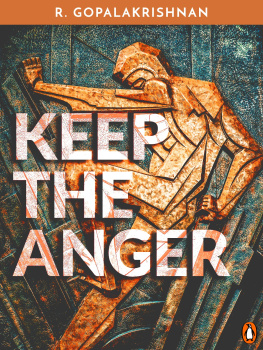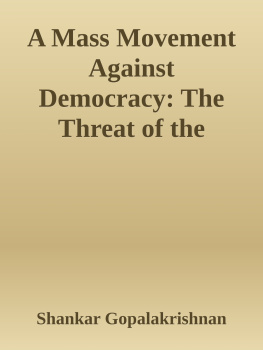R. Gopalakrishnan - A Comma in a Sentence
Here you can read online R. Gopalakrishnan - A Comma in a Sentence full text of the book (entire story) in english for free. Download pdf and epub, get meaning, cover and reviews about this ebook. year: 2013, publisher: Rupa Publishers, genre: Religion. Description of the work, (preface) as well as reviews are available. Best literature library LitArk.com created for fans of good reading and offers a wide selection of genres:
Romance novel
Science fiction
Adventure
Detective
Science
History
Home and family
Prose
Art
Politics
Computer
Non-fiction
Religion
Business
Children
Humor
Choose a favorite category and find really read worthwhile books. Enjoy immersion in the world of imagination, feel the emotions of the characters or learn something new for yourself, make an fascinating discovery.
- Book:A Comma in a Sentence
- Author:
- Publisher:Rupa Publishers
- Genre:
- Year:2013
- Rating:5 / 5
- Favourites:Add to favourites
- Your mark:
- 100
- 1
- 2
- 3
- 4
- 5
A Comma in a Sentence: summary, description and annotation
We offer to read an annotation, description, summary or preface (depends on what the author of the book "A Comma in a Sentence" wrote himself). If you haven't found the necessary information about the book — write in the comments, we will try to find it.
A Comma in a Sentence — read online for free the complete book (whole text) full work
Below is the text of the book, divided by pages. System saving the place of the last page read, allows you to conveniently read the book "A Comma in a Sentence" online for free, without having to search again every time where you left off. Put a bookmark, and you can go to the page where you finished reading at any time.
Font size:
Interval:
Bookmark:

a comma in a sentence

Other books by R. Gopalakrishnan
The Case of the Bonsai Manager
When the Penny Drops
What the CEO Really Wants From You

Published by
Rupa Publications India Ltd 2013
7/16, Ansari Road, Daryaganj
New Delhi 110002
Sales centres:
Allahabad Bengaluru Chennai
Hyderabad Jaipur Kathmandu
Kolkata Mumbai
Copyright R. Gopalakrishnan 2013
Foreword copyright Mark Tully 2013
Front cover illustration inspired by a photograph courtesy
The Hindu archives.
First published in Rainlight in 2013.
All rights reserved.
No part of this publication may be reproduced, transmitted, or stored in a retrieval system, in any form or by any means, electronic, mechanical, photocopying, recording or otherwise, without the prior permission of the publisher.
First impression 2013
10 9 8 7 6 5 4 3 2 1
The moral right of the author has been asserted.
Typeset by Recto Graphics, New Delhi
Printed at [PRINTERS NAME, CITY]
This book is sold subject to the condition that it shall not, by way of trade or otherwise, be lent, resold, hired out, or otherwise circulated, without the publishers prior consent, in any form of binding or cover other than that in which it is published.
Dedicated to my father, G. Ramabadran
(a.k.a. Rajam), and my ancestors
I remember, I remember his dignified mien,
With a soul so gentle and a wit so sane,
I crave his presence, a balm for my soul,
Tis twenty long years since Life took its toll.
Born in the year nineteen twelve,
Soon after the Titanic kissed the ocean shelves,
And a score of brave hearts along with Scott,
Scattered in the Antarctic with their brethren apart.
His respect for his parents could not obscure,
Nor his call to duty fails to assure,
A burning desire to make a mark,
And leave his loved ones, in the city to park.
With a quick mind and a formidable will,
Did the village schoolboy unsheathe his quill,
The supreme test of accounting skill,
Did he surmount, bare though his till.
His stride brisk, his bearing erect,
With poise and grace, and pride in his chest,
His face glistening with emotion and appeal,
His voice intense with concern for the sequel.
He nursed in him a hunger to learn,
About all and sundry, no matter what they earn,
His eyes moistened at the plight of the poor,
Much did he stretch, to help them for sure.
Six healthy children did he sire,
Of their education and development he did not tire,
I think he would have been pleased if he had seen,
His offspring, his legacy their inability to wean.
Father, dear father my heart cries out,
The silence is deafening, of that there is no doubt,
I know from his heavenly abode, he watches his offspring,
With a smile and affection, forever doting in the wings.
This poem was composed by my older brother,
R.V. Raghavan.

I first met the author, Gopal, as I came to know him, when he was sitting behind a spacious desk set in his tastefully but unostentatious office in Bombay House, the headquarters of Indias largest business conglomerate, Tata. On that occasion I described him as nattily dressed, with his matching shirt and tie, fashionable rimless spectacles, and neatly trimmed graying hair. He seemed every inch a top modern executive. That impression was confirmed by the staccato but polite sentences in which Gopal talked and his mastery of all aspects of the highly varied twenty-seven publicly listed companies in the Tata group.
The next time I met Gopal he was emerging from the changing room in Mumbais Bombay Gymkhana after playing tennis, before heading for work. He was greeted by several members and was clearly popular and respected. Yet this executivewho has succeeded outstandingly in the highly competitive world of two multinational conglomerates, and is totally at home in the top echelons of Mumbai society who are to be seen in the Gymkhana clubdoes not come from a privileged background.
He and others in his generation were the first members of the family to get a university education, and his father and uncle were the first to move out of their traditional village in the deep south of India.
In A Comma in a Sentence, Gopal tells the story of his family over the last almost two hundred years and six generations. Until Gopals grandfathers time, the Tamil Brahmin family were small-time landowners, some of whom became temple priests. They were perfectly satisfied with traditional village life but, even in those days, had to cope with change. Coping with change becomes the main theme of this family history. It could be called subaltern history because its the story of typical people of their times, the story of how the family gradually came out of the isolation of village life into the world, and succeeded there.
This is not a rags to riches story. There are no sensational twists and turns. But its nonetheless fascinating for that. The six generations accepted and adapted to change, took advantage of new developments, and yet were not swept off their feet. As Gopal says, Each generation felt concerned about how the next generation would cope with change. But the next generation coped marvelously.
The pace of change accelerated from generation to generation. In the early years of the nineteenth century, Gopals family lived in a village where villagers were not much concerned about who their rulers were because the arm of the state was not long enough to reach them. As the railways spread and newspapers began to be published, the remote village of Vilakkudi, in the rice bowl of Tanjore, became less isolated from the rest of India. News which used to be spread by word of mouth from town to village, and was often severely distorted before it even left the town, was now authenticated and spread by the new media. The information they brought made villagers more concerned about their rulers. Gopals great grandfather questioned the justice of British rule when he compared the Indians who died in the Madras famine with the news he had heard about the British feasting at a function to celebrate the proclamation of Queen Victoria as the Empress of India.
Gopals grandfather realized that changes in education had to be accepted. Members of the family had taken pride in the Brahmin tradition that the importance of memory in gaining knowledge is supreme. Without denigrating the value of this tradition and the knowledge that came with it, Gopals grandfather realized that modern schooling was essential if his children were to be adequately prepared for life in the new, fast-changing world. So, he arranged for Gopals father, Rajam, to go to a nearby elementary school, and from there he was sent to a high school.
Gopals father and his brother were the generation that realized they must take advantage of the opportunities offered by Indias burgeoning cities and so moved out of the village. In the village, they would have spent their lives farming three crops a year, and being involved in the village temple, perhaps even becoming priests as earlier generations had done. But agriculture was becoming less and less of a paying proposition. Moving out was not that simple. It required the permission of ones elders. But once again the older generation had the wisdom to appreciate that change must be embraced. The patriarch of the family was Rajams uncle and he was persuaded that the young man was genuinely committed to making a go of it in Calcutta and gave him his blessing.
Font size:
Interval:
Bookmark:
Similar books «A Comma in a Sentence»
Look at similar books to A Comma in a Sentence. We have selected literature similar in name and meaning in the hope of providing readers with more options to find new, interesting, not yet read works.
Discussion, reviews of the book A Comma in a Sentence and just readers' own opinions. Leave your comments, write what you think about the work, its meaning or the main characters. Specify what exactly you liked and what you didn't like, and why you think so.

